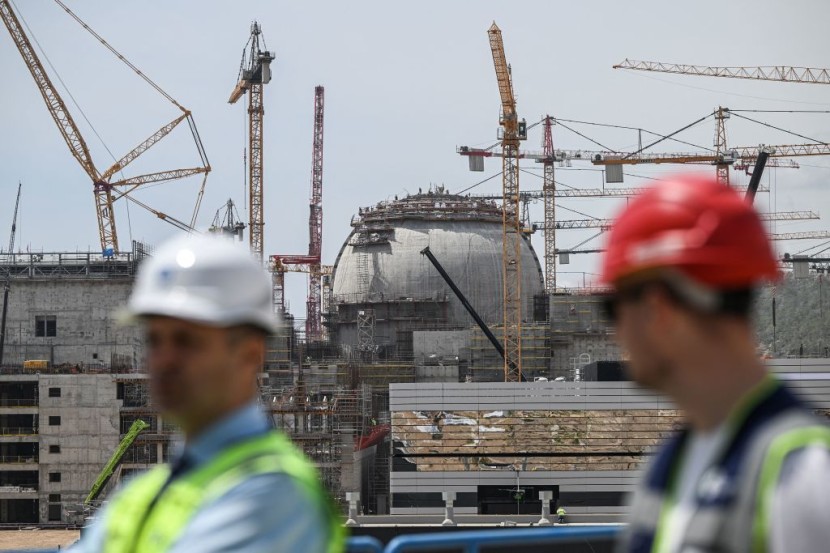
The Federal Security Bureau (FSB) announced that Russia had apprehended two Ukrainians who allegedly planned to attack nuclear power facilities in Russia.
"A sabotage group from the Ukrainian foreign intelligence service attempted to blow up approximately 30 power lines at nuclear power facilities in Leningrad and Kalinin" at the beginning of May, the FSB was quoted as saying in a statement by Russian news agencies.
Ukrainians Planned to Attack Russia's Nuclear Power Facility
It was stated that the objective was to cause "serious economic injury to Russia and tarnish its reputation." The men had planted explosives in four pylons transporting high-voltage lines from the Leningrad nuclear power station, the Moscow Times reported.
The Ukrainian special services intended to close down nuclear reactors, disrupt nuclear power plant operations and cause severe economic and reputational damage to the Russian Federation.
The attacks were to occur on the eve of the May 9 anniversary of the victory over Nazi Germany. It was not specified when the individuals were detained. In addition, explosives were planted near seven similar pylons connected to the Kalinin nuclear facility.
The FSB stated that it was searching for a third individual of Ukrainian-Russian descent and that 36.5 kilograms of explosives and approximately 60 detonators were discovered in the residences of the suspects and their alleged accomplices. According to the FSB, two Russians who allegedly assisted the trio were also detained.
The Leningrad facility is the largest nuclear power reactor in Russia. It is situated on the Gulf of Finland near St. Petersburg. The nuclear power plant at Kalinin is 350 kilometers north of Moscow.
According to the FSB, the saboteurs were enlisted in 2022 by Ukraine's foreign intelligence service (FISU) and trained at bases in Kyiv and the region of Mykolaiv. According to the FSB, they infiltrated Russia via Poland and Belarus.
"The defendants have confessed to cooperating with the Ukrainian foreign intelligence service in order to plan and conduct sabotage on Russian land," the FSB said, as per Reuters.
The Russian Security Service referred to the attack as "nuclear terrorism" and stated that it was scheduled to occur on May 9, when Russia celebrates its victory in World War II, also known as the Great Patriotic War.
According to the FSB, the saboteurs were able to blow up one pillar, and two Ukrainian citizens were detained following the incident: Aleksandr Maystruk, born in 1978 and dubbed Mechanic, and Eduard Usatenko, born in 1974 and dubbed Maks.
Yury Kischak, a Russian and Ukrainian national who was born in 1953 and went by the alias YuBK, and is presently in Belgium, was also added to the wanted list.
Maystruk and Usatenko told the FSB that they were recruited in 2022 by an officer of the Ukrainian Foreign Intelligence Service named Vitaly Gorbatyuk, trained in special centers in the Kyiv and Mykolaiv regions, and then unlawfully crossed the Russia-Belarus border via Poland.
It added that the explosives were transported via an international cargo transportation channel along the route through the Polish city of Chelm and the Lithuanian city of Shalchininkai and then through the territory of Belarus to the Rzhevsky district of the Tver region in Russia.
Following the incident, a criminal case was initiated under the articles "Sabotage" and "Illegal acquisition, transfer, sale, storage, transportation, or carrying of explosives or explosive devices." Under the first provision, the utmost sentence is twenty years in prison, while under the second, it is eight years, as per aa.com.
US Suspects Ukraine of Conducting Drone Attack Against Russia
According to US officials, Ukraine was likely responsible for the thwarted drone attack on the Kremlin earlier this month and several other murders and incursions on Russian territory.
Intelligence officials do not know which unit was responsible for the drone attack or if Ukrainian President Volodymyr Zelensky knew about it beforehand. The US has limited confidence in its assessment based on intercepted communications with Ukraine and Russia because it has not yet identified the specific unit responsible for the attack.
Two drones attacked the Kremlin in Moscow on May 3, but they caused minimal damage before Russia disabled them. Ukraine has denied responsibility for the drone assault, as it has for other alleged attacks on Russian soil.
Russia has repeatedly blamed Ukraine and the United States for the drone attack, considering Washington to be more than just a strategic partner for Kyiv. US officials believe a pro-Ukraine group was behind the attack on Russia's vital revenue source, the Nord Stream oil pipelines, last year. Some Ukrainian covert operations operate mainly independently and do not always require Zelensky's approval.








